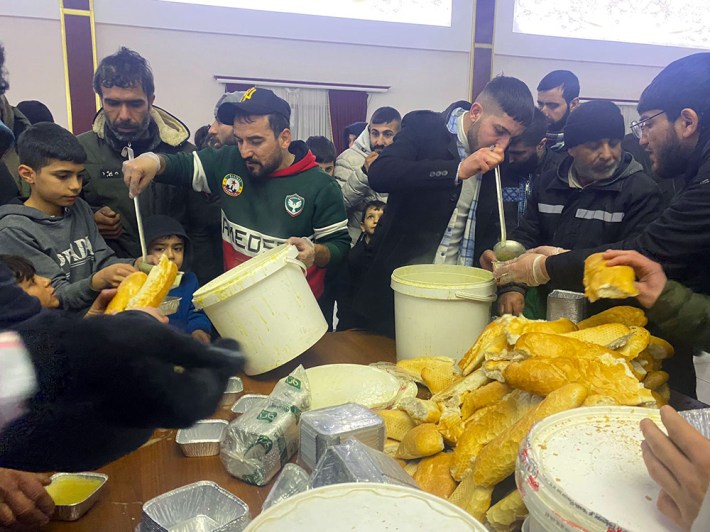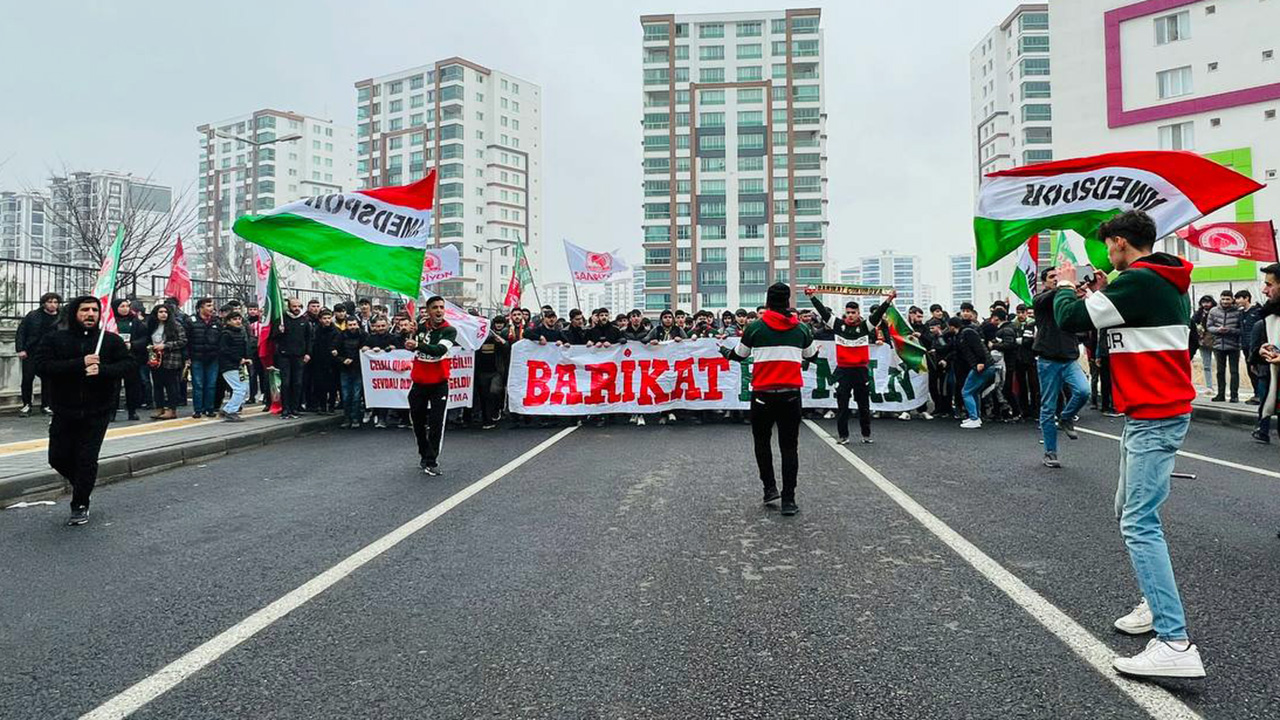DIYARBAKIR, TURKEY — In the city of Diyarbakır, the Turkish flag is everywhere. The white crescent and star on the crimson backdrop is flown in the parks and adorns the bunting along the wide, dusty boulevards. The face of Recep Tayyip Erdoğan, Turkey’s president, is just as inescapable. It’s plastered on the side of buildings, five stories tall, and again on posters flanking the drive from the airport. The city is saturated with these images, and with the memories of the destruction Erdoğan’s regime wrought just five years ago.
In one of the city’s parks, the three of us are waiting to meet up with a group of locals who carry those painful memories with them. The people we’re waiting for are Kurdish, as are most of the city’s residents. The Kurdish name for Diyarbakır, which sits near the southeast corner of Turkey, just 70 miles from the Syrian border, is Amed. This is the name the locals often use for their city, which is regarded as the Kurdish capital and animated by the Kurdish freedom struggle.
The people we’re waiting for are also fans of the city’s professional soccer team, Amedspor. The team was reconstituted under that name in 2014 and has been playing in the third tier of the Turkish league system ever since, much to the chagrin of the Turkish Football Federation.
A member of the Amedspor supporter’s group Barikat (Barricade) walks up to meet us; their tiny minivan is double-parked across the street. Our visit was originally planned around attending a home game with members of Barikat, but fans were prohibited from attending that fixture by the federation after an Amedspor fan was seen displaying a Kurdish flag in the stands at a previous game. Determined to make the most of this solidarity visit, from one supporters group to another, Barikat organized a packed agenda: meeting the youth supporters and visiting with the founder of the team, who is currently under house arrest.
First up: the Amedspor training facility to watch the Amedspor women’s game. We pack into the minivan like sardines. Daran, a young man with a manicured mustache and a navy polo shirt, is the driver, and Rîzgar, bearded, is in the passenger seat.
“There are three types of facial hair,” Daran explains. “You have the full Islamic beard, and the Turkish nationalist mustache which looks like a crescent, and lastly the shorter leftist mustache.” It’s hard to know where the mustache length cut-off is, but “you know it when you see it,” he says. “Unfortunately, we can’t make our mustaches look like stars.”
The Barikat supporters aren’t allowed to have stars on their logos either, a stipulation handed down by a football federation hostile to them and their politics. The team has been political since inception: a project spearheaded by the popularly elected HDP (Peoples’ Democratic Party, or the “People’s government” as the Barikat supporters call it), led by Selahattin Demirtaş, their young, charismatic leader, who has been in prison on political charges since 2016. Barikat helped push the leaders to call the team Amedspor, itself a political act in a country where, until recently, speaking Kurdish was illegal.
In 2013, there was an attempt at resolution between the Kurdish guerilla forces and the Turkish state. During this peace process, stronghold cities in the Kurdish struggle put forward self-organized projects like workers’ cooperatives, women’s self-governance, and cultural projects. It all came to a head in 2016 when Turkey laid siege to the city; the Turkish military staged an operation that killed hundreds and leveled much of the historic Sur district, the geographic and cultural heart of the city. Since then, the Turkish state has deposed and jailed the HDP's popularly elected leaders and has effectively depopulated the historic district, replacing it with a Turkified kitsch commercial district. All the self-organized projects have been snuffed out, except for Amedspor.
“Religious, secular, it’s all cool,” Rîzgar says. He splits the difference–leftist mustache, full beard. “Together, we are Barikat.”
“They’re building another mosque over there,” he says, gesturing out the window to the left. Rîzgar says he goes to the mosque, but as he points out, “there are already three or four mosques behind that one.” Turkey has been engaged in these vanity projects, as well as the building of luxury apartments in addition to the swanky commercial district that continues to replace the historic section of the city the state destroyed.
We pull into a parking lot and file out of the car, and are immediately surrounded by around 30 teenage boys, classic Gen Z kids decked out in streetwear–Adidas, puffer vests, a pair of sweats with a pattern made of crimson 666’s.
Scarves–red and green, emblazoned with "BARIKAT"–are slung around their necks, and the drummers are in full game-time mode, beating out rhythms for the kids to chant to. Before we can fully take stock of the moment, the kids drape the scarves they’ve reserved for us around our necks.
Rîzgar and Daran had told a few of them we were coming, and that we had come from America. They start sharing this information amongst themselves, “America, America” punctuating their conversation. The sports unit of the police, who have been assigned to this game, stand in the corner and look up with some vague interest before returning to their phones.
The kids form a chaotic line and shake each of our hands in succession. And then it’s game time. The Amedspor women’s team is playing Izmir, a friendly team.
The kids, as well as families with younger children, stream into the stands–10 or so rows of green and red seats, Amedspor’s colors. The team walks onto the pitch, and the teens are ready–they start slipping smoke bombs and fireworks out of their hats and pockets, lighting everything at once.
Between the stands and the pitch, a line of police form. One cop holds a camcorder, recording the fans throughout the game. The Turkish national anthem blares from the speakers. At a previous game, 19 fans were arrested for not standing during the anthem. Today, people stand sullenly, but remain silent.
When the team scores a goal, the supporters chant “Jin, Jîyan, Azadi” ("Woman, Life, Freedom"), the rallying cry of the Kurdish women’s movement. Mor Barikat (Purple Barricade) is the parallel women’s group, working in tandem with, but independent from Barikat. This structure mirrors the rest of the Kurdish movement, which emphasizes parallel and equal power-sharing between men and women. They have worked to create a safe, fun, and welcoming environment for women in the stands, and to ensure that the women’s team gets as much love from the fans as the men’s team.
A huge shift has happened over one generation. As Reyhan from Mor Barikat told us in a phone interview, “In fact, there are those who also bring their moms with them and tell us that they want to watch the game together with us.” It was very unusual for women to attend games before, and Reyhan describes a culture of policing of women’s participation in public life. “We shattered that and told the families that women also belong in the stands.”
During halftime, one of the teens hooks up his phone to a Bluetooth speaker to play music, queuing up “Beritan,” a song about a Kurdish revolutionary guerrilla woman who, when cornered by Turkish military proxies and out of bullets, chose death over capture and threw herself over the cliff behind her.
A kid in a red T-shirt swoons, clutching his heart at the opening chords, belting out “Beritan, Beeeritan” at the chorus. Another Kurdish song comes on. He starts shrugging his shoulders to the beat–the Kurdish Halay dance, performed in a line. A little boy with sweeping eyelashes and sweet dimples stands to his right, beaming up at him. The older boy grabs his hand and starts showing him the steps.
Religious, secular, it’s all cool. Together, we are Barikat.
Rîzgar, Barikat member
This is a moment for teaching. The adults are coaching the teens on how to do the right chants at the right time (“Amedspor you’re everything, our blood runs green and red”) while the teens coach the children. The cops are also learning. We later learn that the recording they made that day will be used as a police training video.
The game ends in a draw. The supporters chant their hearts out the whole game, jumping like springs, arms draped around each others’ shoulders. They are learning how to be fans, and, under the watchful eye of the Turkish police, how to struggle.
Sur, one of Amed’s central districts, is named for the historical walls that surround it. The area has been home to dozens of civilizations over at least four millennia, and the walls are at least 1,700 years old. The gates of the walls face the four cardinal directions, mirroring the way Kurdistan has named itself, cleaved in four by the nations—Turkey, Iraq, Syria and Iran—that claim it.
Sur is the beating heart of Amed. Its narrow streets intertwine through different sections, weaving between coppersmiths, tobacco sellers, and a panoply of shops selling every variation of chili pepper imaginable. Nestled in between are cafes, teahouses, and restaurants formed around a central grill where chunks of liver are skewered, cooked, and served between layers of flat bread.
These historic gates and all of the entrances to Sur were sealed off during the fall of 2015, as a strict 24/7 curfew was established for more than 100 days. Turkish special forces and paramilitary formations shelled the neighborhood and conducted raids from house to house.
It’s remarkable that the neighborhood held for as long as it did, considering that those defending it were mostly neighborhood youth trained shortly before the fighting by a handful of guerrillas. Beyond the actual violence, the trauma inflicted by the siege of Sur on the city and its cultural memory is immense. During those months, instead of the lively hubbub of a bustling cultural district, there was the sound of war. The shelling could be heard nightly throughout the whole city.
On one of the winding Sur streets is an idyllic cafe with a flagstone courtyard framing a grand willow tree stretching up three stories. This now-iconic cafe was in the thick of the war. Its owner, Merthan, has managed to open it up again after extensive repairs. He has the heavy eyes of someone who has endured the desecration of a city that is very much a part of him. As we sip on menengiç coffee, made from the fruit of the terebinth tree, he recounts those days of war.
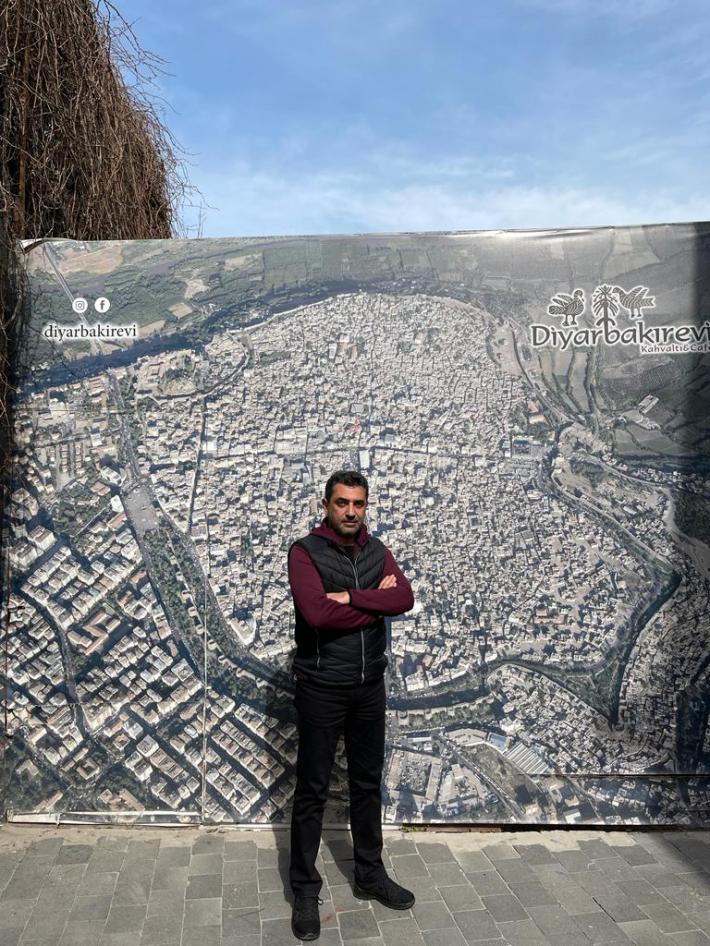
Merthan shows us a large aerial photograph of what Sur was like before the war, tacked on a wall near the entrance of the cafe. The photo covers the whole neighborhood in all of its glory. He looks at it longingly as he explains the recent rapid deterioration of relations between the Kurds and the Turkish state. “When I took this photograph was a different time," Merthan says. "In fact it was taken from an army special operations helicopter. We just asked them to let us use it to document the architectural heritage of Sur. Only a few years later, they were using the same helicopters to throw us out to die.”
Amedspor was born during years of relative hope. Starting around 2010, the Turkish state’s engagement with the Kurdish movement as whole, and specifically with the PKK (Kurdistan Workers' Party) as its armed force, appeared to enter a new and promising phase. A “peace process” was formulated and put into effect, engaging Erdoğan’s AKP government (Justice and Development Party—in power for the past 20 years) with the guerrilla leadership based out of the Qandil Mountains in northeastern Iraq, and most crucially with Abdullah Öcalan, the historic leader of the PKK, who has been imprisoned on an island since 1999.
The interlocutor to this process became the HDP, the legal, parliamentary wing of the Kurdish movement. Although gathering most of its political force from the Kurdish movement, the HDP was conceived as a political party that spoke to the problems of all the different people in Turkey, whether they be Turkish, Kurdish, or any other ethnicity. It promoted a left-leaning program of worker rights and environmentalism, and the rights of oppressed groups like women and LGBTQ+ people.
The “peace process,” also sometimes referred to as the “resolution process,” had been in the works for a few years. In 2012, members of the HDP began regularly visiting Öcalan in prison to exchange letters between him and PKK leadership in Qandil.
The most notable and ironically final act of the peace process occurred during the Newroz celebration of 2015. Newroz, celebrated during the spring solstice across the region, has extra significance in Kurdistan, having been reconceptualized by the Kurdish movement as a day of celebrating resistance. More than a million people attended the rally in Amed, and for good reason: word was out that Öcalan had personally written a new letter addressing the crowd, as he had the two years prior. HDP MP Sırrı Süreyya Önder read his letter from stage to the crowd listening in total silence:
The forty year struggle filled with pain has not been in vain, but at the same point it has also reached a point of unsustainability. History and our people demand from us a democratic solution and peace in the spirit of these times…
This was the political climate into which Amedspor was born. Kurds living inside the boundaries of Turkey were beginning to see a glimmer of light after enduring decades of a protracted war, costing the lives of more than 35,000 people and seeing at least 2,400 of their villages emptied and burned to the ground, displacing close to three million people.
Despite occasional flareups, the years between 2012 and 2015 were years of peace and hope. It’s important to stress, and relevant to the story of Amedspor, that this was not merely a daydream: Kurds were experiencing degrees of newfound autonomy in their lands. Fitting in with the theoretical shift emerging from Imralı prison, a thorough municipalism was being implemented by the movement, now in charge of 94 municipalities across the southeast of Turkey. This was felt in Amed, the largest city in the region, and also a “metropolitan municipality,” granting it special access to resources dispensed by the central government.
The Kurdish movement immediately implemented some of its core organizational principles, such as having co-chairmanship with one woman and one man. Various projects were conceived, including a free educational support and tutoring program, women's solidarity houses, and cultural centers. Özlem Yasak was a member of the social development office, which was tasked with conceiving of and implementing many of these projects. She emphasized the collaborative process they undertook, how it centered collaboration with residents to figure out how the programs should run. A special emphasis was placed on the Kurdish language, historically repressed by the Turkish State. “People could speak in their mother tongue freely, and contribute,” Yasak said. Buildings and streets were renamed in Kurdish, even though the official education system continued in Turkish; afterschool Kurdish language programs for children were launched. This period of relative calm also opened up space for the free expression of a Kurdish cultural identity, which had previously been suffocated by war. People were finally speaking, singing, and playing soccer in Kurdish.
“It was so hopeful,” Yasak said. “I’m always telling my friends when talking about that time that I was working 10 hours a day, but at night was still hanging out, going out with friends. I was never feeling tired. I guess it was a feeling of high positive energy. Every component of the city was touching each other, and everyone was moving. These moves bring us really concrete outcomes that the city was needing.”
The AKP’s relatively hands-off approach was a cynical attempt to court the Kurdish votes. Perhaps it would have worked, but Kurds in Turkey could not compromise on supporting their compatriots across the border. For them, the dream of autonomy was not to be confined to one country.
Since 2011, Syria had been descending into civil war. In the midst of this, the PYD, a sister organization with organic links to the PKK, which was well organized in the northern part of the country, took control of a third of the Syrian territory, populated heavily by Kurds. Known as Rojava (West) to the Kurds, they declared their autonomy.
Only a few years later, they were using the same helicopters to throw us out to die.
Merthan, Sur resident
They put forward a program based on multiethnic cultural identities, a communal council-based system of running society, and ecological principles. While the AKP could tolerate certain smaller-scale municipal experiments on the northern side of the border, it could not let such a revolutionary project exist in Syria. The Turkish state and military assisted the various Islamist factions, such as El-Nusra and ISIS, in their fight against Syrian Kurds, sometimes with overt material support and at other times clandestinely. In the defense of their homeland, the Kurds organized the YPG (People’s Defense Forces) and its all-women counterpart, the YPJ.
The situation in northern Syria came to a head during the 2014 siege of Kobane, a city running along the border between Turkey and Syria. By then, most of the politically active Kurds in Turkey had been mobilizing in defense of Rojava–for the Kurds, the border is artificial; many have families spanning it. Donation drives sent food and supplies to their compatriots by any route available. Under siege and surrounded by ISIS, the Kurdish movement in Turkey, Iraq, and Syria requested that Turkey open up a corridor for additional support from Iraq to make it through. Turkey refused.
Riots broke out in dozens of cities in Turkey. After two days, 42 people were dead, with most of them in Amed. This was the breaking point for the Kurdish movement in Turkey. Any goodwill forged during the peace process was lost.
Within this climate the national elections were to be held, a referendum on Erdoğan. The AKP suffered a catastrophic defeat at the ballot box, and it signaled a brutal turn in strategy. The so-called peacemakers were suddenly ruthless occupiers. The AKP forced a repeat election to be held in November 2015. In the interim, it ramped up hostilities with the Kurds. The AKP resumed bombing the guerrillas in the mountains to drum up support with its base; in response, the PKK ended its ceasefire.
Resistance in cities escalated, as did the repression. In defiance, municipalities across the region declared autonomous self governance and the Turkish military prepared for war on its own people. The peace process was in tatters.
“The city war was the moment you feel nothing would be the same again like in the past,” Yasak said. “There were signs but you never expected them to destroy the city itself, bomb the city itself, kill people. It was horrible.”
Those tasked with defending the city were the youth of Amed, organized at the last minute with minimal training and under a variety of group names. The general consensus is that these young people were not battle-ready, especially in the face of the overwhelming force of NATO’s second-largest army. Spending time with the school-age members of Barikat, it was hard not to think of them carrying AK-47s through the streets of Sur rather than flares into a soccer stadium.
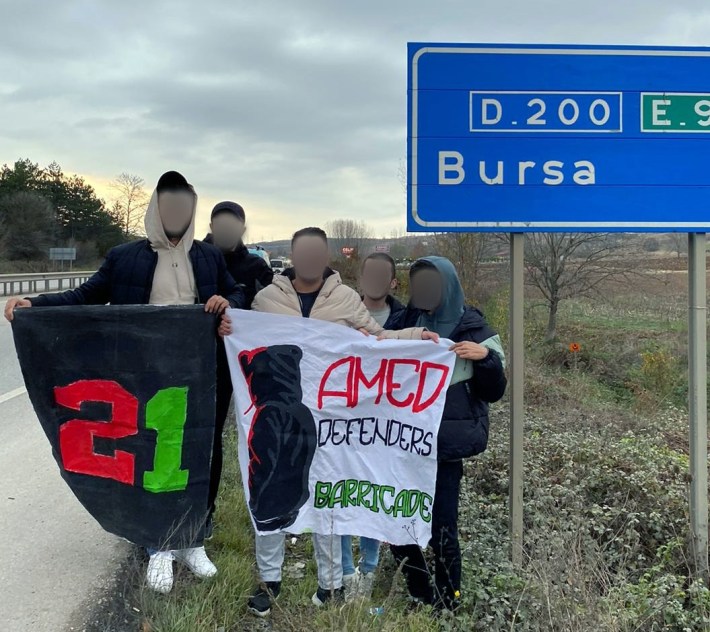
Anthropologist Haydar Darıcı, who has studied the politicization of Kurdish children, has written that "youth have made themselves the central actors of the Kurdish movement, redefining what ‘political’ means for everyone by arming themselves in urban areas, creating barricades that keep the army and police out of neighborhoods, and by becoming subjects around which new political discourses, practices, insurgencies and counter-insurgencies unfold.”
The war was fought on multiple fronts. Military checkpoints, armored vehicles patrolling the streets, and men in ski masks without identification looting houses placed fresh scars on the city. So did the war that was being simultaneously waged in the realms of culture, history, archeology, architecture, and urban geography. This social fabric was torn apart by the Turkish state as it destroyed homes and other buildings, making whole parts of the city uninhabitable.
Alongside the destruction came a number of eminent domain decrees from the Turkish state, used to reimagine and rebuild Sur into the AKP’s bleak vision of the future.
Outside of Merthan’s cafe is a large section of Sur reimagined by the AKP. A sterile landscape that was surely generated by some second-rate architectural modeling software—cookie-cutter shops lined one next to each other with a pristine Turkish flag hanging from the windows of each. When the Turkish military would set up bases in the mountain towns of Kurdistan, they would paint a massive flag on the side of mountains and top it off with a patriotic quote such as “Happy is one who calls himself a Turk!”
There are no mountains for Turkey to claim in Amed, so it has to settle for real estate. All throughout Sur are kitschy outdoor malls adorned with neatly hung Turkish flags. Merthan tells us about gaggles of tourists coming to Sur, seemingly shipped in from some other part of Turkey, to enjoy the fruits of their great victory over “Kurdish terror.” This type of cultural misappropriation is constant in Amed. During our visit, the AKP cultural ministry was wrapping up the “Sur Culture Road Festival,” its centerpiece being a stage at the main entrance to Sur hosting performers well known by their proximity to the AKP. It is against this erasure of Amed’s culture that Amedspor stands, as a defiantly Kurdish cultural institution.
“Amedspor is a symbol,” Yasak said. “It symbolizes the resistance of the city: what we built over all these years, and then what we lost.”
“Three of our friends were picked up by police because of the Sur Festival,” Rîzgar tells us. “We’ve been organizing heavily against it.” Their three friends were arrested for tweeting critiques of the festival.
Because the Turkish Football Federation has issued a ban on fans in the stadium for Amedspor’s next two home games, we watch the men’s game broadcast together at the supporters’ clubhouse. We sit with Rîzgar, Daran, and about 20 teens who have decided to tag along. They insist on giving us the three cushiest seats; they pile onto the remaining chairs, stools, and armrests. The game is presented on two phones, strategically angled against plastic water bottles. The room is spare, but clean, with a prominent wall display of supporter scarves from teams around the world.
“Some supporters from Cyprus and Galicia came here,” Rîzgar says. “We also have connections with an anti-Zionist Israeli supporters' group and St. Pauli.” Barikat has also been in contact with other political supporters' groups, but not many have been able to come to Amed.
We fish out the gifts we’ve brought: stickers, T-shirts, and hats of our own supporters' group. With much ceremony, we pin the Oakland Roots scarf to their wall. As we’re talking, the kids erupt into claps and chants. Amedspor scores for a 2-0 lead.
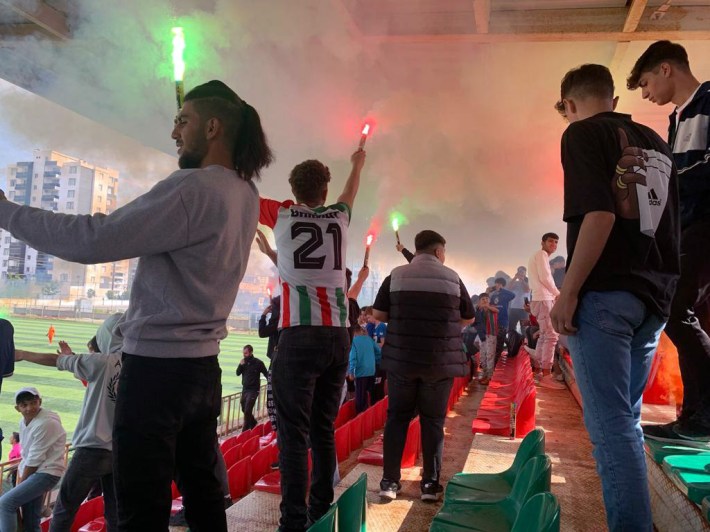
They tell us about the Barikat logo, emblazoned on the scarf: the four-legged minaret set behind the historic walls of Sur. We had walked past the four-legged minaret the day before, right in the heart of Sur, at the edge of the open wound Turkish soldiers had cut into the city in 2015. Tour groups stood around it and took pictures. In 2015, the Kurdish human rights lawyer Tahir Elçi was shot and killed in front of it while giving a press conference calling for a ceasefire between the Turkish security forces and Kurdish militants. Three police officers were charged with the murder in 2019; that trial is still underway, and the Amed Bar Association has called for the recusal of the current judges, because they’ve blocked the testimony of a former prime minister in the case.
The star is a reference to the Kurdish freedom struggle that they managed to sneak into the logo. They have to do a lot of sneaking. They aren’t allowed to use red, green, and yellow, the traditional colors of Kurdistan, so they sub in white for yellow.
Then there are the chants. When we ask, they insist that they “don’t do the super political chants.” We ask for translations, and immediately start laughing. Resist Amed / What gives you life is resisting / Stop and listen this song is for you / Trust the love of the mountains. Rîzgar laughs sheepishly. “Sometimes we say fans instead of mountains, because the two words sound similar in Turkish.” The mountains are a reference to the history of Kurdish armed struggle and their mountain strongholds. One of its most potent proverbs: No friends but the mountains. They have their own rendition of “Bella Ciao,” the old Italian partisan song, a staple for an anti-fascist supporters' group.
Amedspor is a symbol. It symbolizes the resistance of the city: what we built over all these years, and then what we lost.
Özlem Yasak
There’s a certain political astuteness among these supporters: They share a clear narrative about how the team came to be, a clear political position (“We are against industrial football”), an understanding of the political role of the supporters in pushing the agenda (“We pushed for it to be called Amedspor”), and savvy about how a soccer team and fandom can play a role in a larger political struggle (“Sports is a way of disseminating culture, and culture becomes political”). Every action is political. Every action is strategic. And every action is a part of something whole, totalizing, and social.
For example, the supporters take a hard stance against hooliganism: no sexist chants, no swears, no throwing rocks at the opposite team (or their own team when they lose). “We’re against violence, but not against self-defense,” Rîzgar says.
“Football culture can be a reflection of patriarchy,” Reyhan from Mor Barikat tells us later. “We’re trying to abolish that.”
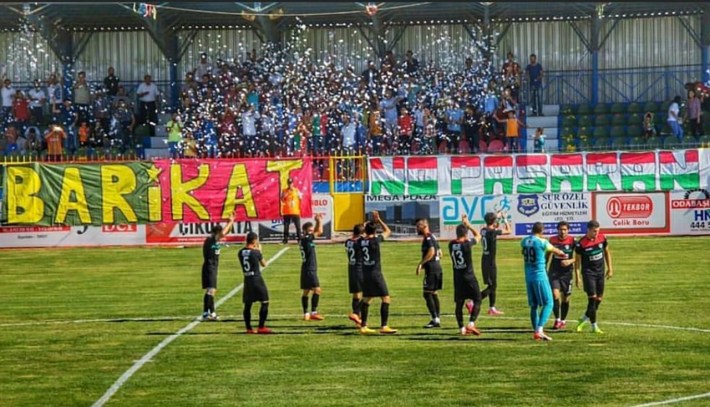
We pose for a photo under the big Barikat and Mor Barikat sign, then break to head back to the practice stadium, where we had watched the women’s game. The team is coming, and as fans, we have to greet them with a party to celebrate a 3-0 victory.
Somehow, the kids beat us to the practice stadium parking lot. We all watch the road, waiting for the bus to approach. A few kids sit on the road out front, smoking cigarettes and chatting. As the bus approaches, the kids crowd in front, ushering the bus in with chants and drumming. Trucks passing in the other direction give generous honks. Amed has won today.
We stand around with Rîzgar, Daran, and other Barikat supporters as the team files off the bus, shakes some hands, and walks into the team offices. The dimpled boy, who earlier had been learning the halay dance, runs up to us. One of our Barikat friends sends him off, up the steps to the clubhouse. “He always goes and asks for a match jersey after the game, and he always gets one.” He comes back minutes later, beaming and victorious.
Amid the throng, we’re ushered into the offices. Knowing that we’re writing a story, Barikat insists that we talk to the current head of the team, Selahattin Yıldırım, a man who looks incredibly weary. We sit down across from his imposing desk, and are offered tea.
“We want to make Amedspor the champions, and send them to the Champions League,” Selahattin says. But there is little excitement when he speaks; he is a man beleaguered by the weight of running a team on a shoestring budget. Whenever fan bans are imposed, he says, Amedspor also suffers financially, because the team is almost exclusively reliant on ticket revenue and local business sponsorships. Municipal funding has been cut off.
As we walk out, Rîzgar mentions quietly that we have been drinking smuggled tea—he wants us to know that. Many daily staples in Amed are smuggled in from across the border, mostly from Iraq: tea, cigarettes, sugar. It’s a way to boycott Turkish products, which until recently, were manufactured directly by the state. They still drink smuggled tea partially by force of habit and partially because in this economy, smuggled tea is cheaper.
We step out into the hot afternoon, leaning up against the fence for a moment and looking out at the graffiti on the wall flanking the other side of the road. Kids have tagged it in large blue letters: "Deniz Naki 62."
It would not be possible to tell the story of Amedspor without mentioning its champion. In the world of professional soccer, the relationship between club, player, and city can be cold and transactional, stripped of all romance, loyalty, and politics. “Industrial football,” as the members of Barikat might call it. But then Deniz Naki signs with Amedspor during the height of open conflict between the Kurdish freedom movement and the Turkish state, and we remember that without a heart, this game is nothing.
Always more Maradona than Pele, Naki was born in 1989 to dissident communist parents living in exile in the Kurdish diaspora in Germany. He came up through the German football league system, including three seasons with St. Pauli, which has a legendary left-wing supporter culture.
An attacking midfielder and productive scorer who helped bring St. Pauli back into the Bundesliga, Naki also cemented his reputation as a “political” player, perhaps most famously with a cut-throat gesture directed at the notoriously right-wing fans of Hansa Rostock after scoring a goal in 2009. That move would earn him a three-match ban and the enduring support of left-wing fans the world over. During a 2014 stint with the Ankara-based club Gençlerbirliği, he tweeted support for the embattled city of Kobane, then under siege by Islamic state militants with the tacit support of the Turkish state. Days later, he was attacked and beaten in the street by three men who called him a “dirty Kurd” and claimed this was his last warning. He left for Germany soon after, citing the risks to his family. Needless to say, he fit right in at Amedspor.
The Kurds are like scorpions in a ring of fire. If the scorpion can’t break through, it kills itself. But we have always broken through.
Metin Kılavuz
By the summer of 2015, the HDP had passed the 10-percent threshold to enter Turkish Parliament and won governance of the vast majority of Kurdish municipalities in Turkey’s southeast region. The Turkish regime, threatened by the movement’s gains, began a crackdown on Kurdish dissidents and resumed airstrikes in Rojava and against PKK camps in Iraq. Bombs targeting Kurdish activists killed dozens across the Kurdish region of Turkey, including Amed. In response, the PKK announced the resumption of hostilities. Across Bakur, municipalities declared autonomous self-governance, and the youth began preparations for armed self-defense. The peace process unraveled. And in the midst of it all, Deniz Naki inexplicably signed off on a transfer to Amedspor.
Career-wise, the move to a third-tier team in the Turkish Football Federation made no sense. Naki could have signed a contract with any Bundesliga 2 team with prospects. Instead, he signed to a Turkish league team in a city on the brink of war, as a person who had already been beaten by right-wing anti-Kurdish thugs.
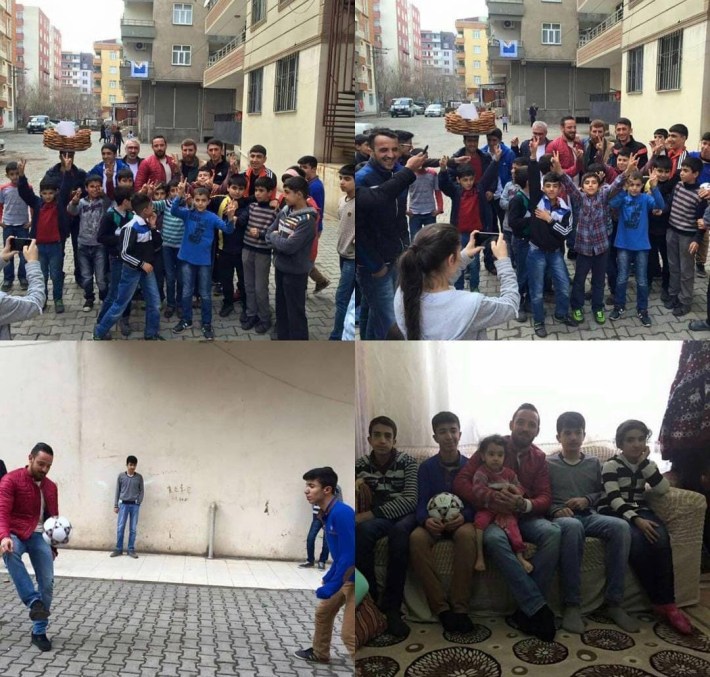
During our time in Amed, again and again, we heard different variations of the same sentiment: In this country, Amedspor is not just a football club. During the city-war period, this took on intense and sometimes tragic significance. The Turkish regime was whipping up nationalist fervor in order to justify their brutal crackdown on the Kurdish movement, and as Kurds became terrorists in the eyes of the state, Amedspor became a terrorist team.
In January 2016, Amedspor traveled to Istanbul to play a Turkish Cup game against Başakşehir, a team that plays in the highest tier of the Turkish soccer system. Against all odds, Amedspor was leading the game 2-1 as the contest entered stoppage time. Four minutes into extra time, Semih Şentürk scored the equalizer for Başakşehir and celebrated with a soldier’s salute, a not-so-subtle nod to the ongoing Turkish military operation in Amed and the Kurdish southeast. After the match, riot police beat the traveling Amedspor fans who chanted defiantly:
Barikat is here, standing tall…
Everywhere Sur, everywhere resistance…
Everywhere Cizre, everywhere resistance…
Don’t let the children die, let them come to the game.
One hundred Amedspor fans were detained and paraded through the stadium by riot police. Amedspor players and management refused to leave until the fans were released. Later, 30 supporters would be charged with terrorism-related offenses. The team was fined 25,000 lira (about $8,000 at the time), and fans were banned from attending the subsequent game for chanting “ideological slogans.”
Three days later, Amedspor played Bursaspor, a team from a region well known for its nationalist sympathies. In the 66th minute, Naki scored what would be the winning goal, taking Amedspor into the quarterfinals of the Turkish Cup. He celebrated with the two-fingered “victory” sign associated with the Kurdish freedom movement.
After the match, Naki published a social media post dedicating the victory to “those who have lost their lives and those wounded in the repression in our land which has lasted more than 50 days.” His post read, “We as Amedspor have not bowed our heads and we will not do so. We went onto the pitch with our belief in freedom and won.” He signed off in Kurdish: “Her Biji Azadi,” or “Long live freedom.” For this, Naki was given a 12-match ban and fined 6,000 euro by the Turkish Football Federation for "ideological propaganda.” Days later, the Amedspor team headquarters were raided by counter-terrorism units.
The quarterfinal match took place on Feb. 9 of that year, in Amedspor’s home stadium against one of the titans of Turkish football, Istanbul’s Fenerbahçe S.K. No fans were allowed into the stadium to view the match, another political penalty imposed by the federation. Before the match started, both teams unfurled a banner reading “Children shouldn’t die, they should come to the match.” The same day, a 17-year-old was shot dead by Turkish security forces in Amed.
Amedspor is a team of the other. Black people, LGBTQ people, Armenians, anyone who feels like an other. Because of this, it’s going to have a long life.
Metin Kılavuz
After the whistle was blown, Amedspor players turned towards the empty supporters section and refused to play for the first minute in protest. Outside the stadium, Turkish riot police blasted Amedspor fans with water cannons as military jets buzzed the stadium overhead.
On March 10, 2016, the siege of Sur was lifted, but the nightmare didn’t end. In the following months, 82 percent of the land and buildings within the historic neighborhood of Sur were expropriated by the government and demolished as part of a frenzied development plan that would make even the most shameless real estate developer blush. The objective was to wipe even the memory of those rebellious Kurds from the cityscape itself.
By the spring of 2016, Amedspor had become the sporting avatar of the Kurdish region, which meant that their continued existence was an act of defiance. In April, after a win against Ankaragücü, the team’s management was attacked and beaten by a mob. In July, a failed coup against the Erdoğan regime gave the state carte blanche to escalate the repression. Thousands of dissidents, journalists, and academics were jailed or fired and blacklisted. The HDP-elected officials that had held on after the city wars were likewise removed from office, jailed and replaced by handpicked regime officials.
In Amed, the appointed trustee government cut funding for Amedspor and the team struggled to pay player salaries. Team management continued to be harassed, and outspoken officials were removed, mirroring the crackdown on Kurdish politicians. Naki continued to be a lightning rod for nationalist ire. In August 2017, he was attacked on the field by a rival fan. Five months later, while visiting his childhood home in Germany, gunmen opened fire on Naki's car.
Weeks later, on Jan. 20, 2017, the Turkish military invaded Afrin, a Kurdish majority region in Rojava. Up to this point, Afrin had been largely spared from the worst horrors of the civil war in Syria, and its implementation of self-governance, pluralism, and women's rights had made it a model of relative stability for its residents, including thousands of refugees who had fled there from other parts of the ravaged country. The Turkish invasion displaced hundreds of thousands of Kurds and minorities who were replaced by Syrian proxy forces and their families loyal to the Turkish regime, representing a violent and intentional demographic change that can only be called ethnic cleansing.
Naki, still in Germany, spoke out against the invasion and called for participation in demonstrations against it. For this, he was tried in absentia. He was sentenced to 18 months in prison and received a lifetime ban from the federation for “ideological propaganda.” Unable to return to Turkey for fear of prosecution or worse, Naki was forced to terminate his contract with Amedspor. In a farewell to his team and homeland, he wrote:
Capitulation leads to treason, resistance to victory. We resisted in Koçgiri, we resisted in Ağrı, we resisted in Dicle, in Dersim, in Kobanê, and we will resist in Afrin. We have resisted in Kurdistan, and we will go on resisting.We shall win… I will return some day with the saying “what doesn’t kill you makes you stronger” and we shall live days of peace, serenity and freedom together. We will succeed. This is not a message of goodbye but of existence.
When we were invited to Metin Kılavuz’s house, we asked for an address. “Don’t worry, the supporters come over to my house all the time," he said. "They’ll know where it is.”
They do. For the final time that day, we pile into cars and drive to Metin’s house. He and his wife open the door, pairs of house slippers fanned around their feet for us all to switch into. We’re ushered into a formal sitting room and offered another round of tea.
Seated, Metin pulls up his trouser cuff, revealing an ankle monitor. In April 2022, he was arrested and detained in Ankara for 12 days. Since then, he has been unable to leave the confines of his apartment. “Not even to the gardens in the apartment complex,” he says.
Metin is one of many opposition leaders who has been detained in the last few years. When people asked him for legal advice in prison, he told them, “Don’t ask me about the law. There is no law here.”
Metin is a human rights lawyer who spent the late 90s working with a colleague to convict the Turkish state of their recorded atrocities. He suspects this as the reason why he was taken in. He was questioned about this work, along with his work in the “people’s municipality” and his role in founding Amedspor. “It’s a miracle we haven’t been assassinated,” he says, as his wife winces.
“Amedspor is like my child,” he says.
In 2010, he formed a sports council to discuss the viability of starting a soccer team. Over the course of five conferences, they hammered out the intentions for a sports program in the city, prioritizing democratic and participatory principles as well as women’s participation at all levels. Like many revolutionary Kurdish institutions, the sports council is co-chaired by a man and a woman.
Metin’s living room is arranged in a circle. As we sip our tea, he chats with the Barikat supporters, offering them his two cents on a number of issues, including the fact that there should be more robust organizing with Mor Barikat and women in the city.
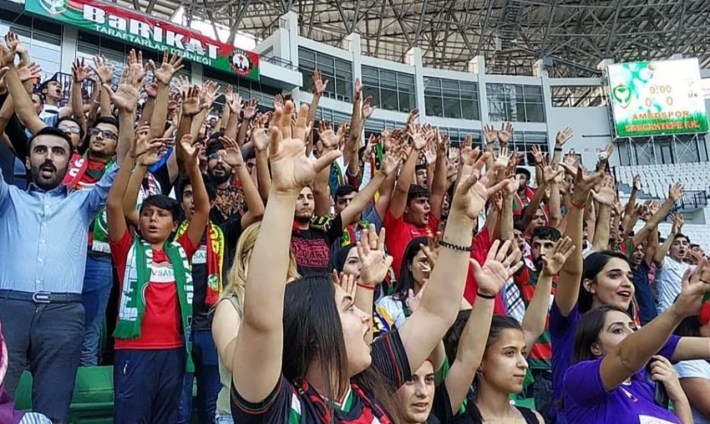
“Sports are used in many ways to maintain systems of oppression,” he says. Metin speaks about politics with enviable ease, with many metaphors deployed to explain his position. On players: “The stadium is not an arena and the players are not gladiators. They are workers.” On democratic participation: “Amedspor is a novel we all contribute to.” On the Kurdish struggle: “The Kurds are like scorpions in a ring of fire. If the scorpion can’t break through, it kills itself. But we have always broken through.”
“We came to this other definition: For us, sports is different people coming together and it works for universal peace,” Metin says.
After the decision was made, the councils and young people of the city came together and poured the concrete for the training grounds and offices where the women’s game had been held that morning. Some people brought paint; some people brought stacks of rebar.
But after the city war, when the Turkish state effectively took over control of the municipality and jailed the “people’s municipality,” cooperation and funding from the city government ceased. As a result, Amedspor is in a precarious position financially—cut off from the resources a city can provide, constantly dealing with fan bans that cut into potential revenues, and only able to get small sponsorship deals.
Hostilities with other teams are constant. A few weeks before we arrived in the city, a Turkish commander of the Afyon province told his local team to crush Amedspor as revenge for “the act of terrorism in Mersin,” referring to an alleged PKK attack on a police station in the western city of Mersin. And on March 5 of this year, fans of Bursaspor threw plastic water bottles, firecrackers, and knives at Amedspor players. Referees refused to call the match.
Today, the youth of Amed aren't dying behind sandbagged barricades or being crushed beneath the treads of tanks. The repression is more subtle: Lengthy prison terms for critical social media posts, pervasive surveillance, militarized policing of daily life, and grinding poverty that defines life under the current Turkish occupation.
But they still have Amedspor. “Amedspor is a team of the other,” Metin says. “Black people, LGBTQ people, Armenians, anyone who feels like an other. Because of this, it’s going to have a long life.”
After our meeting with Metin, our Barikat friends drop us off at our hotel. We idle outside for a few minutes, chatting a bit more. They have plans to go to Istanbul the following week for a game against Erokspor. The fan ban persists, but the plan is to gather outside the stadium.
We ask how long they’ll stay. “We don’t stay,” they say. “We just go on the bus, go to the game, and then come immediately back.” It’s a 15-hour drive from Amed to Istanbul. They’ll show up with fireworks and drums and scarves and red, green, and white. They’ll show up with chants and the well-practiced defiance of the dispossessed. Because Berxwedan Jiyanê. "Resistance is life," and the struggle continues.
Postscript: In the process of writing this piece, a series of historic earthquakes shook the southeast of Turkey, leaving over 44,000 people dead and millions displaced. Although not at the epicenter of the destruction, Amed was impacted. The situation in Syria is receiving even less attention than Turkey, but is also quite dire. If you can, please support The Kurdish Red Crescent at www.heyvasor.com.
